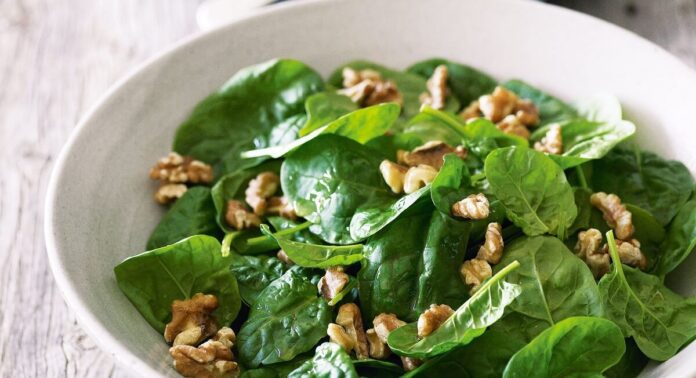Spinach nutrition facts present important nutrients in spinach, like carbohydrates, sugar, soluble and insoluble fibre, sodium, vitamin, minerals, fatty acids, amino acids and water.
Below is the nutritional profile that contributes to its immense health benefits.
Read also: Spinach : 19 Incredible benefits
|
Spinach (Spinacia oleracea), Raw, Nutritive value per 100g. RDA – Recommended Dietary Allowance |
||
Principle |
Nutrient Value |
Percentage of RDA |
| Energy | 23 Kcal | 1% |
| Carbohydrates | 3.63 g | 3% |
| Protein | 2.86 g | 5% |
| Total Fat | 0.39 g | 1.5% |
| Cholesterol | 0 mg | 0% |
| Dietary Fiber | 2.2 g | 6% |
Vitamins |
||
|---|---|---|
| Folates | 194 µg | 48.5% |
| Niacin | 0.724 mg | 4.5% |
| Pantothenic acid | 0.065 mg | 1% |
| Pyridoxine | 0.195 mg | 15% |
| Riboflavin | 0.189 mg | 14.5% |
| Thiamin | 0.078 mg | 6.5% |
| Vitamin A | 9377 IU | 312% |
| Vitamin C | 28.1 mg | 47% |
| Vitamin E | 2.03 mg | 13.5% |
| Vitamin K | 482.9 µg | 402% |
Electrolytes |
||
| Sodium | 79 mg | 5% |
| Potassium | 558 mg | 12% |
Minerals |
||
| Calcium | 99 mg | 10% |
| Copper | 0.130 mg | 14% |
| Iron | 2.71 mg | 34% |
| Magnesium | 79 mg | 20% |
| Manganese | 0.897 mg | 39% |
| Zinc | 0.53 mg | 5% |
Phyto-nutrients |
||
| Carotene-ß | 5626 µg | — |
| Crypto-xanthin-ß | 0 µg | — |
| Lutein-zeaxanthin | 12198 µg | — |
| (Source: USDA National Nutrient database) | ||
-
Water
Spinach has a high content of water with 1 cup of cooked spinach providing 164 gram or about 5 oz. of water. This is particularly important because our skin cells are also made up of water. Consuming plenty of water keeps your skin cells hydrated, making your skin look young and radiant.
-
Vitamin A
It is a rich source of vitamin A. A cup of cooked spinach provides about 943 mcg of this vitamin which is equal to 105% of the recommended daily allowance (RDA) for men and 135% of the RDA for adult women. However, chronic use of vitamin A in high levels (more than 10 times the RDA) can lead to toxicity. So it is necessary to check the consumption of this vitamin.
Read also: 22 Essential benefits of Cocoyam leaves (Kontomire)
-
Vitamin C
Vitamin C is an antioxidant which is vital for growth and repair of your skin cells. Since this vitamin is not stored in the body, it has to be provided from your daily diet. Spinach is rich in vitamin C with one cup of cooked spinach providing about 17.6 mg or nearly 20% of the RDA for adult men and 23% of the RDA for adult women.
-
Iron
As stated earlier, iron is a vital part of haemoglobin, a protein in red blood cells that supplies oxygen to the tissues. One cup of cooked spinach has about 6 ½ mg of iron which is equal to 81% of the RDA for adult men and 36% of RDA for adult women.
-
Magnesium
Magnesium plays an important role in healing skin wounds and infections. A cup of cooked spinach provides about 157 mg magnesium which is about 37% of the RDA for adult men and 49% of the RDA for adult women.
-
Oxalic Acid
Cooked spinach is preferred to raw one because, like most leafy greens, it has oxalic acid. This acid interferes with the body’s calcium absorption but cooking the spinach can eliminate its effects. Therefore, it is advisable to cook it than adding it to a salad in the raw form.
Reference:
21 Amazing Benefits Of Spinach (Palak) For Skin And Health (http://www.stylecraze.com)


